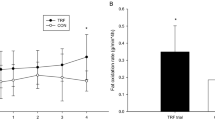Abstract
OBJECTIVE: Assessment of the effect of six months consumption of reduced fat or full fat products on energy intake and body weight, as a function of dietary restraint.
DESIGN: A small realistic supermarket in the University departments provided full fat commercial products and their reduced fat alternatives. Volunteers visited the supermarket once a week. Half of them were required to take the reduced fat products, the other half the full fat products. They bought additional products in normal shops.
SUBJECTS: Two matched groups (age, genders, body mass index (BMI)), one dietary restrained and one dietary unrestrained, were derived from the total group of 220 healthy men and women. This resulted in four groups differing in dietary restraint and in belonging to the full fat or reduced fat group.
MEASUREMENTS: Energy intake, macronutrient composition of food intake, energy density and weight of food ingested were measured before the run-in period and at 2–4 weeks, three and six months after the start of the study, by controlled food intake diaries.
RESULTS: Percentage energy from fat, and energy density changed significantly, according to the reduced or full fat diet, in all subjects. Energy intake and body weight remained constant in the dietary unrestrained on a reduced fat diet and in the dietary restrained on a full fat diet. Energy intake increased significantly, with a trend of body weight increase in the dietary unrestrained on a full fat diet. Body weight decreased significantly, with a trend of decreased energy intake, in the dietary restrained on a reduced fat diet.
CONCLUSION: A reduced fat diet, in combination with unrestrained eating behaviour which resulted in energy intake compensation, contributed to weight maintenance. Weight reduction was the consequence of a reduced fat diet in combination with restrained, non-compensatory eating behaviour. A full fat diet combined with unrestrained eating behaviour led to increased energy intake. Restrained eating behaviour with a full fat diet prevented an increase in energy intake and body weight. Thus dietary restraint compensated for an increase in energy density, whereas dietary unrestraint compensated for a decrease in energy density.
This is a preview of subscription content, access via your institution
Access options
Subscribe to this journal
Receive 12 print issues and online access
$259.00 per year
only $21.58 per issue
Buy this article
- Purchase on Springer Link
- Instant access to full article PDF
Prices may be subject to local taxes which are calculated during checkout
Similar content being viewed by others
Author information
Authors and Affiliations
Rights and permissions
About this article
Cite this article
Westerterp-Plantenga, M., Wijckmans-Duijsens, N., Verboeket-van de Venne, W. et al. Energy intake and body weight effects of six months reduced or full fat diets, as a function of dietary restraint. Int J Obes 22, 14–22 (1998). https://doi.org/10.1038/sj.ijo.0800538
Received:
Revised:
Accepted:
Published:
Issue Date:
DOI: https://doi.org/10.1038/sj.ijo.0800538
Keywords
This article is cited by
-
The prevalence of zinc deficiency in morbidly obese patients before and after different types of bariatric surgery
BMC Endocrine Disorders (2021)
-
Food Cues and Obesity: Overpowering Hormones and Energy Balance Regulation
Current Obesity Reports (2018)
-
A prospective study of erythrocyte polyunsaturated fatty acid, weight gain, and risk of becoming overweight or obese in middle-aged and older women
European Journal of Nutrition (2016)
-
The Association Between Diet and Obesity in Specific European Cohorts: DiOGenes and EPIC-PANACEA
Current Obesity Reports (2014)
-
Preoperative Nutritional Deficiencies in Severely Obese Bariatric Candidates are not Linked to Gastric Helicobacter pylori Infection
Obesity Surgery (2013)


